The Entrepreneur’s Guide To Connecting With Awesome Mentors
Mentors and advisors have been a huge part of our growth. Here’s how to get their attention and expertise.
I don’t live in San Francisco or New York.
I wasn’t born into business royalty.
I had virtually no network and no money when I started out.
If there’s one thing that, aside from simply working hard, helped me accelerate my learning and the growth of our business over the years, it’s building relationships with people a lot smarter and more successful than I am.
Mentors and advisors have been there. They’ve struggled through the same trenches that you’re battling your way through now.
The right ones will know exactly what challenges you’re facing, no matter how unique you think your business is.
They’ll have seen or tried every solution in the book, and they can guide you toward smarter decisions in business and in life.
Many of the biggest, highest-impact decisions that we’ve made at Groove have come as a result of nudges or feedback from our advisors.
Since this is a question that comes up quite a bit, today I’m sharing my approach to connecting with mentors and advisors.
I hope you find it helpful.
If You Want Help, Be Helpful.
I’ve had advisors and other entrepreneurs show me emails where a young founder pitched them, completely cold.
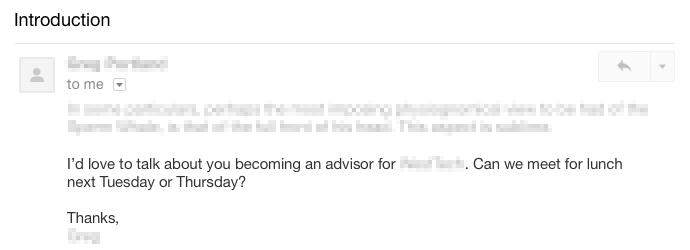
99.9% of the time, it’s not going to be that easy.
And it shouldn’t be.
Because if your potential mentor as good as you’re hoping, their time is going to be in high demand. Every minute of theirs is incredibly valuable.
Simply put, they have more to lose than you do. So why should they assume all the risk and commit their time to helping you, when they’ve seen no benefit?
To get help, you need be helpful.
Make it a habit to reach out to successful people and offer them your help, with no expectation of anything in return.
- Do you have a particular skill that the potential mentor might not have (i.e., coding, design, SEO, etc…)? Offer to apply it to help on their business or side project.
- Can you think of an idea that would improve their business? Send it over.
- Do you know anyone that the person might appreciate an introduction to? Can you make that warm introduction for them?
- Is there a book or product that you think they’d appreciate, that you could send to them?
If there’s a “shortcut” to building relationships with busy, successful people, this is it.
And while I wouldn’t consider myself anywhere near the caliber of the types of people that I would seek out as mentors, I’ve been lucky to have been approached for guidance from many entrepreneurs. I’ve seen some bad pitches, and I’ve seen some incredible ones that use that tactics above.
Here’s one example that caught me right away:
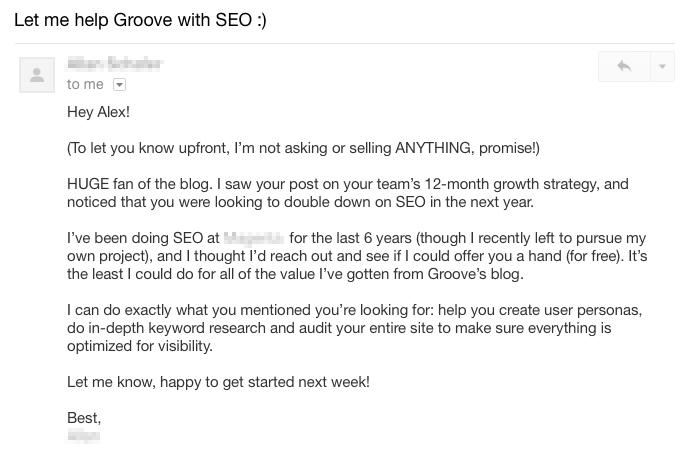
This email didn’t just result in me agreeing to help the founder with his company; it also turned into a paid gig for him in helping us implement his idea, and multiple introductions to other founders I know.
If, starting today, you delivered value to just a single potential mentor each day, then in a month, 30 important people will know your name and remember you. They may not all want to work with you, but you’ll begin to be known for being the kind of person who provides value, rather than the 99% of people who simply ask and hope to take.
How to Ask for Help
Once you’ve proven that you’re a contributor of value, rather than a taker, asking for help is a whole lot easier.
But the way you ask still matters.
Now, I don’t think you should use a template or a formula – relationships are very personal, and the way you ask for help will depend greatly on each individual relationship – but it’s important to consider a few things:
- Be short and clear. Busy people get hundreds of emails each day, don’t make it an easy choice to skip reading yours because it’s too long.
- Gently remind the person of your relationship. Again, they get a ton of emails. Giving them a quick reminder of who you are (and what you’ve done for them) is helpful.
- Keep your ask specific. Don’t make them do the work of figuring out what you want.
Here’s the exact email that I sent a while ago that turned into a free 60-minute Skype session with one of the most sought-after marketers in the world:
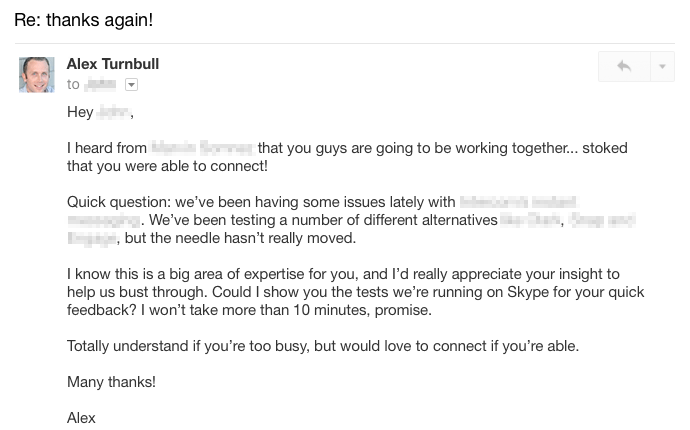
I kept it short, reminded him of where he knows me from (I had introduced him to a friend of mine), and made a specific, direct ask.
He said yes, and not only did I get more time than I asked for, but I ended up getting insights from our conversation that turned into big conversion wins for Groove.
Relationships Are Investments
Investors – startup VC’s, for example – have a portfolio of companies that they’ve invested in.
They don’t expect every single one to deliver a return.
In fact, they know that many of their investments will end up as complete losses.
Some of their startups will return their initial investment, and maybe a little bit extra.
But very few of their investments will become massive successes.
That’s the thing about massive successes, though: you don’t need many of them.
Relationship building is very similar.
Invest in as many high-quality relationships as you can. Nurture each one and continue delivering value on an ongoing basis.
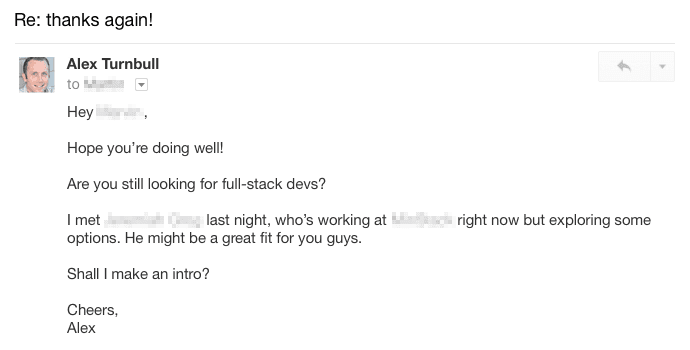
Some of those relationships might never end up benefiting you, but the few that do will make it all worth it.
How to Apply This to Your Business
My advisors have been absolutely invaluable in helping Groove grow from nothing to a $130K+/month company.
And every founder I’ve discussed this with agrees: a good mentor is an incredible catalyst for personal and professional growth.
I hope that this post inspires you to seek out experienced mentors of your own. As with anything, it’s worth going for the absolute best. But if you put in the hard work, you’ll get the attention of the people you’re looking for.
To get started, just follow this checklist, every day for the next 30 days (and beyond):
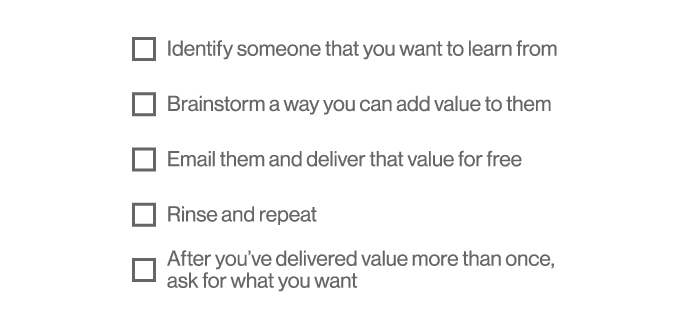
And one more thing: just like there will always be people you can learn from, there will always be people who can learn from you. Pay it forward and help others when you can.
It’s what keeps this whole thing going.